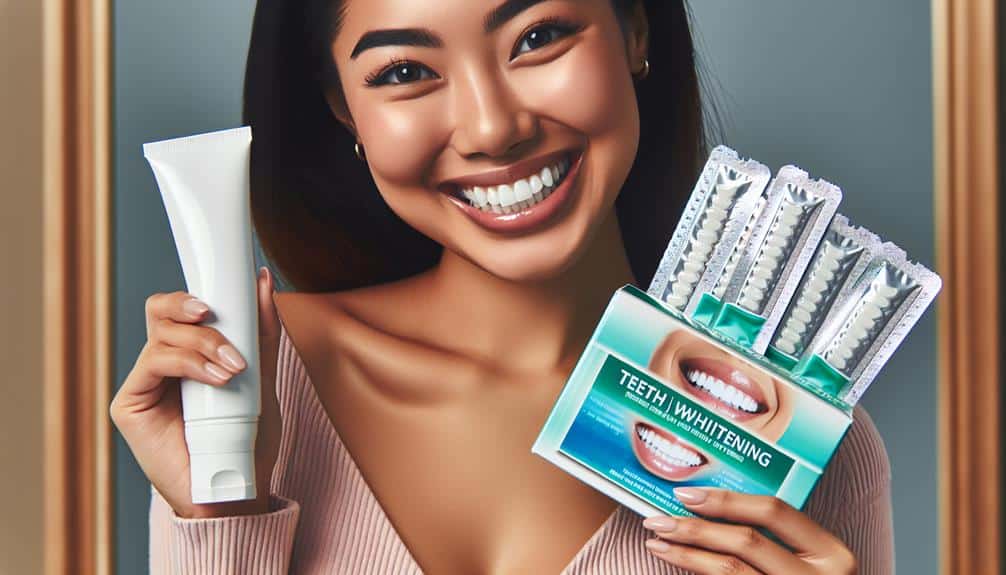If you have sensitive gums and want to whiten your teeth effectively, it's crucial to prioritize gentle techniques. Opt for toothpaste and whitening strips designed specifically for sensitive gums with lower concentrations of hydrogen peroxide to minimize discomfort. Gel whitening products and alcohol-free whitening mouthwashes can also be safe options to brighten your smile without aggravating sensitivity. Remember, taking precautions and selecting the right products tailored for sensitive teeth are key steps in achieving a whiter smile while ensuring the health of your gums and teeth.
Key Points
- Choose whitening products designed for sensitive gums and low hydrogen peroxide concentrations.
- Prioritize gentle whitening techniques like carbamide peroxide over harsh options.
- Follow usage instructions carefully to avoid over-whitening and gum irritation.
- Maintain consistent oral hygiene practices to support sensitive gums during whitening.
- Consider whitening pens or gels for targeted application and minimal gum contact.
Causes of Teeth Sensitivity
Do you know what factors contribute to teeth sensitivity? Tooth sensitivity is a common issue that many people experience. Several factors can lead to this discomfort. One of the primary reasons for tooth sensitivity is exposed dentin, the layer beneath the tooth enamel. When the enamel wears down or gums recede, the dentin becomes more vulnerable to external stimuli, causing sensitivity. Dental checkups are important in identifying and addressing these issues early on to prevent further discomfort.
Another common cause of tooth sensitivity is enamel erosion. Acidic foods and beverages, as well as conditions like acid reflux, can wear down the enamel over time, leading to sensitivity. Grinding your teeth can also contribute to enamel wear and sensitivity. It's essential to address these habits to prevent worsening sensitivity.
Additionally, tooth sensitivity can result from gum disease, which can cause gums to recede and expose the sensitive parts of the teeth. Regular dental checkups can help detect and treat gum disease early, reducing the risk of tooth sensitivity.
Best Practices for Sensitive Gums
One effective approach to managing sensitive gums is implementing a consistent oral hygiene routine tailored to alleviate discomfort and promote gum health. Sensitive gum care involves using a soft-bristled toothbrush to gently clean your teeth twice daily. Make sure you're using fluoride toothpaste, as it helps strengthen enamel and reduce tooth sensitivity. Avoid brushing too vigorously, as this can irritate sensitive gums. Flossing daily is important to remove plaque and food particles that can contribute to gum sensitivity. Consider using an alcohol-free mouthwash to further support gum health without causing additional irritation.
Tooth sensitivity relief can also be achieved by using a desensitizing toothpaste containing ingredients like potassium nitrate or strontium chloride. These substances help block pain signals from reaching the nerves in your teeth. Additionally, consider scheduling regular dental check-ups to address any underlying issues that may be causing gum sensitivity. Following these important practices can help you manage sensitive gums effectively and improve your overall oral health.
Gentle Whitening Products to Consider
Consider incorporating gentle whitening products into your oral care routine to effectively brighten your smile without causing sensitivity in your gums. When choosing whitening products, opt for those specifically designed for sensitive teeth and gums to minimize irritation while still achieving effective results.
- Toothpaste for Sensitive Teeth: Look for toothpaste with low abrasiveness and potassium nitrate to help with sensitivity while gently removing surface stains.
- Whitening Strips for Sensitive Gums: Choose whitening strips formulated for sensitive gums, usually containing ingredients like hydrogen peroxide in lower concentrations.
- Gel Whitening Products: Gel-based whitening products can be gentle on sensitive gums while effectively whitening teeth; make sure they're designed for sensitive use.
- Whitening Mouthwash: Use a whitening mouthwash that's alcohol-free and contains fluoride to strengthen enamel and prevent sensitivity.
- Sensitive Teeth Whitening Pens: These pens allow for targeted application, minimizing contact with gums and reducing the risk of irritation.
Natural Remedies for Sensitive Teeth
When addressing sensitivity in your gums, exploring natural remedies for sensitive teeth can offer a gentle and effective approach to promoting oral health. Herbal solutions have been used for centuries to alleviate tooth sensitivity.
For example, rinsing with aloe vera juice can help soothe inflamed gums and reduce discomfort. Another beneficial herb is chamomile, known for its anti-inflammatory properties; you can brew chamomile tea and use it as a mouthwash to ease sensitivity.
Additionally, DIY treatments like oil pulling with coconut oil can aid in strengthening teeth and reducing sensitivity over time. The antimicrobial properties of coconut oil help combat bacteria that may contribute to gum sensitivity.
Moreover, a saltwater rinse can help balance the pH levels in your mouth, reducing sensitivity and promoting overall oral health. By incorporating these natural remedies into your oral care routine, you can effectively manage tooth sensitivity while promoting a healthier smile.
Precautions for Safely Whitening Teeth
To ensure the safety of whitening your teeth, it's essential to consult with a dental professional before starting any whitening treatment. Your dentist can provide personalized guidance based on your specific oral health needs and help you avoid potential risks.
Here are some precautions to contemplate for safely whitening your teeth:
- Sensitivity Management: Prioritize products designed for sensitive teeth to minimize discomfort during and after the whitening process.
- Use Gentle Bleaching Techniques: Opt for gentle bleaching methods like those using carbamide peroxide instead of hydrogen peroxide, as they're less harsh on sensitive gums.
- Follow Instructions Carefully: Adhere strictly to the instructions provided with the whitening product to prevent overuse or misuse, which could lead to irritation.
- Avoid Over-Whitening: Don't overdo the whitening process; excessive bleaching can weaken enamel and increase sensitivity.
- Maintain Good Oral Hygiene: Continue to brush and floss regularly to support the health of your teeth and gums throughout the whitening process.
Frequently Asked Questions
Can Teeth Sensitivity Be Worsened by Certain Whitening Techniques?
Using certain whitening techniques can worsen teeth sensitivity. To manage this, consider whitening product alternatives with lower concentrations of active ingredients. Always consult with your dentist for personalized advice on maintaining white teeth without exacerbating sensitivity.
Are There Specific Foods or Drinks That Should Be Avoided to Prevent Sensitivity After Whitening?
When it comes to sensitivity after whitening, steering clear of acidic foods like citrus fruits and acidic drinks such as sodas can help prevent discomfort. Remember the saying, "an ounce of prevention is worth a pound of cure."
How Long Should I Wait After a Whitening Treatment Before Consuming Hot or Cold Foods?
After a whitening treatment, wait at least 48 hours before consuming hot or cold foods. This waiting period helps reduce tooth sensitivity, as your teeth may be more porous post-treatment, making them prone to discomfort when exposed to extreme temperatures.
Can Sensitive Gums Affect the Effectiveness of Whitening Products?
Your gums' health plays a vital role in the effectiveness of whitening products. Managing sensitivity is essential. Choose gentle whitening techniques to minimize impact. Prioritize gum health for the best whitening results without discomfort.
Are There Any Long-Term Effects on Teeth Sensitivity From Frequent Whitening Treatments?
To manage sensitivity and guarantee long-term care post whitening treatments, monitor your enamel health, use desensitizing toothpaste, avoid acidic foods/drinks, and consult your dentist. Regular check-ups and gentle whitening practices promote lasting oral health.



